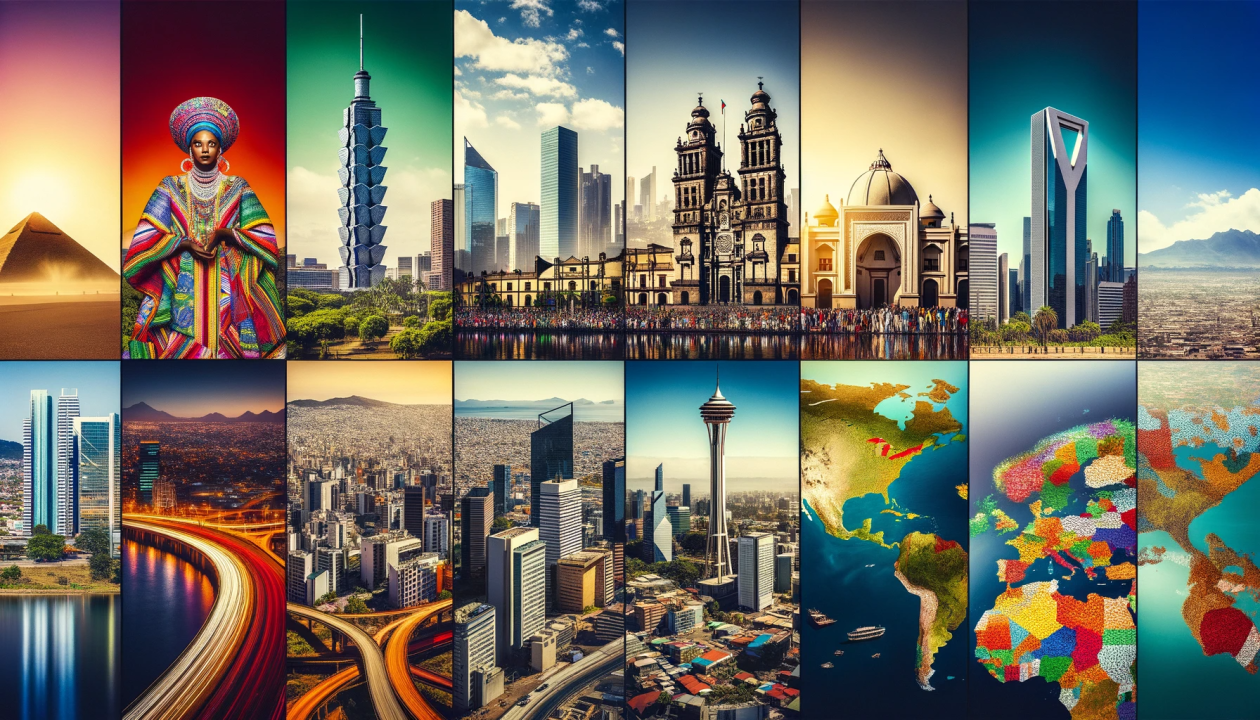Emerging markets have long been a hotbed for highgrowth investment opportunities, driven by rapidly developing economies, a young and growing workforce, and increasing access to technology and global trade. As we look to the next decade, several emerging markets are poised to experience significant economic expansion, making them key destinations for investors looking to diversify their portfolios and tap into growth potential. In this article, we will highlight five emerging markets that are set to soar over the next ten years.
1. India: The Next Global Superpower
India’s economy has been on an upward trajectory for years, and it shows no signs of slowing down. As the world’s most populous country with over 1.4 billion people, India’s demographic profile presents a compelling case for longterm growth. The country’s large and youthful population—more than half of which is under the age of 25—means there is a vast labor force, growing consumer demand, and an emerging middle class that will drive economic expansion for years to come.
India’s tech sector has already made waves globally, with companies like Infosys, Tata Consultancy Services, and Wipro leading the charge in IT services and outsourcing. In addition, India has become a global hub for startups, particularly in areas like fintech, edtech, and ecommerce. The government’s push to digitize the economy through initiatives like Digital India and the expansion of internet access is accelerating this trend.
The Indian government is also focused on infrastructure development, including transportation, energy, and smart cities, which will further boost growth. As the country continues to urbanize and adopt advanced technologies, India’s GDP is expected to grow at a steady pace, making it one of the most attractive markets for investors in the coming decade.
2. Vietnam: Asia’s Rising Manufacturing Hub
Vietnam has emerged as one of Southeast Asia’s most promising emerging markets, with a rapidly growing economy and increasing global investment. Over the past few years, Vietnam has become a key destination for manufacturers seeking to diversify their supply chains away from China, particularly in industries like electronics, textiles, and consumer goods. The country offers a young, educated workforce, low labor costs, and a favorable business environment for foreign investors.
The government has prioritized reforms to improve infrastructure and make the business climate more attractive, such as easing restrictions on foreign direct investment and implementing free trade agreements with countries like the U.S., Japan, and the European Union. As global companies look to reduce their dependence on China, Vietnam is stepping in as a manufacturing alternative.
Additionally, Vietnam’s burgeoning consumer market is poised to take off. With a population of around 100 million people, nearly 70% of whom are under 35, the country has a vibrant young consumer base hungry for new products and services. This demographic shift, combined with rising incomes and expanding internet access, will fuel demand in sectors ranging from retail to tech.
3. Nigeria: Africa’s Economic Powerhouse
Nigeria, Africa’s most populous country with over 200 million people, is an emerging market with immense growth potential. Despite challenges such as political instability, corruption, and infrastructure gaps, Nigeria remains one of the largest and most dynamic economies in Africa. It is rich in natural resources, particularly oil, and its vast agricultural base provides opportunities for growth in food production, manufacturing, and exports.
However, Nigeria’s economic future lies not just in oil, but in its diversification efforts. The country’s tech scene is blossoming, particularly in fintech and ecommerce. Companies like Flutterwave and Paystack are making significant strides in creating digital payment solutions, helping to bring millions of Nigerians into the formal financial system. Furthermore, Nigeria’s growing tech hubs, especially in cities like Lagos, are drawing attention from international investors, positioning the country as the next big tech destination in Africa.
Nigeria’s young and growing population also presents a massive consumer market. The country’s median age is just 18, and as the economy grows and urbanization increases, the demand for goods and services will rise, creating fertile ground for businesses across sectors.
4. Mexico: North America’s Gateway to Growth
Mexico stands out as an emerging market that is uniquely positioned at the crossroads of North America and Latin America. As one of the largest economies in Latin America, Mexico is already an important player in global trade and manufacturing. The country benefits from its proximity to the U.S., its largest trading partner, and is part of the United StatesMexicoCanada Agreement (USMCA), which provides a strong trade framework.
Over the past decade, Mexico has become a key manufacturing hub, particularly in industries like automotive, electronics, and aerospace. The country’s relatively low labor costs and skilled workforce make it an attractive destination for companies looking to offshore production. With trade agreements in place with several countries and increasing foreign direct investment, Mexico is set to continue benefiting from its integration into global supply chains.
In addition to its manufacturing prowess, Mexico is also seeing growth in the tech and financial services sectors. Mexico City has become one of the region’s leading tech hubs, with an increasing number of startups in areas like fintech, ecommerce, and health tech. The rise of Mexico’s digital economy, combined with its large, youthful population and expanding middle class, makes it a country to watch in the next decade.
5. Egypt: The Emerging Market of the Middle East
Egypt is a country on the cusp of a major economic transformation, and its growth potential over the next decade is substantial. With a population of over 100 million people, Egypt is the largest economy in the Arab world, and its strategic location at the crossroads of Africa and the Middle East makes it a key player in global trade, particularly in the energy sector.
The Egyptian government has embarked on an ambitious program of economic reforms and infrastructure development, with significant investments in the Suez Canal Zone, new cities, and energy projects. The expansion of the Suez Canal, one of the world’s most important shipping lanes, is a particularly important development for global trade and Egypt’s economy.
Egypt is also making strides in diversifying its economy. Beyond oil and gas, the country is investing in sectors such as tourism, manufacturing, agriculture, and digital services. The government has launched initiatives to support tech startups, and Cairo has become a growing hub for innovation and entrepreneurship in the region. The country’s large, young population—over 60% of Egyptians are under the age of 30—also presents a promising consumer market, particularly in technology, retail, and food services.
Conclusion: The Next Decade of Growth
The next decade presents exciting opportunities for investors in emerging markets, with countries like India, Vietnam, Nigeria, Mexico, and Egypt leading the charge. Each of these markets is uniquely positioned to benefit from demographic trends, infrastructure investments, and diversification efforts that will fuel their growth in the coming years.
While investing in emerging markets carries risks, the potential rewards are substantial. For those looking to tap into the growth of these dynamic economies, the next decade offers a window of opportunity to gain exposure to the future global powerhouses. By keeping an eye on these top emerging markets, investors can position themselves to capitalize on the next wave of economic growth.



